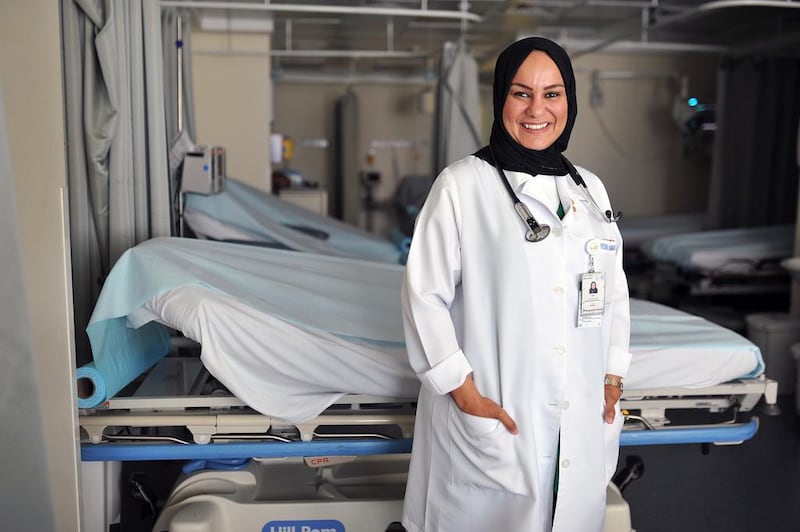Two Emiratis who went to treat the suffering in conflict zones are fine examples of the spirit needed to win the Abu Dhabi Award.
ABU DHABI // Dr Ayesha Al Memari and Dr Aysha Al Dhaheri imagined a life walking the wards of a modern hospital when they embarked on their careers.
But when the call came, they left their duties to go on missions they now see as defining moments in their careers – treating soldiers and refugees in Yemen, Afghanistan and other conflict zones.
The two Emiratis are among recipients of the Abu Dhabi Award and spoke as the search began for next year’s nominees.
Dr Al Memari put her life at risk to bring home UAE soldiers serving in Yemen, becoming the first Emirati female civilian doctor to serve there.
“I took up emergency medicine after looking at the aftermath of the Iraq war in 1990,” said the Mafraq Hospital doctor. “I felt insecure. I wanted to help should something like that happened in my country.”
She got the call in September 2015 when a rocket attack on UAE troops in the Yemeni city of Marib claimed the lives of 45 soldiers. More later succumbed to their injuries.
Dr Al Memari was asked to send an emergency specialist from her hospital, but decided to go herself.
“After five minutes I thought, ‘I studied medicine to serve during a disaster and if I feel afraid to go, how can I ask my team member to?’” she said.
A day later she was on a plane with a medical team to the Yemen-Saudi border.
“We were told that there were many injured soldiers and we had to assess them and bring back as many as we could,” she said.
“When we reached there, a decision was to be made. There were a few critical cases in the field and they needed assistance there. Since I was the most senior doctor on the team I decided to go.
“Shortly after, the team leader came to me and said that the field was full of men and I would be the only lady. That did not bother me.
“As soon as I have my white coat on, I am a doctor.”
Although the whole trip lasted just 12 hours, Dr Al Memari said she had prepared herself to stay there for a few months if needed.
“There were six patients who I went to assess in the field and then organised with my team on the departure of those who were OK,” she said.
“We turned the airplane into a makeshift clinic and were on our toes the entire time.”
Her experience treating the soldiers will stay with her for life.
“Until today I feel glad that I did not let fear control me,” Dr Al Memari said. “If I had delegated that job to someone else, I would have felt guilty for the rest of my life.
“I had never been to a war zone so naturally I was a little scared, but I did not let fear control me.”
Dr Al Dhaheri, a staff colonel, was also among the award recipients in 2015.
She has served in several relief missions to Afghanistan, Yemen, Kosovo and Eritrea.
“When you do military training at the age of 18, it is easier, but I did it after seven years of medical college,” she said.
“You need to be able to take command without discussion and adapt to the physical exercise. It was hard but I accepted the challenge.”
Dr Al Dhaheri worked at Corniche Hospital before being called up to go to Afghanistan in 2010.
“I was there for almost five months at the beginning of the war,” she said. “Our set-up was only 20 kilometres across the border so we were the first camp to meet refugees when they entered the country.
“At that point we were the only group doing baby deliveries because none of the other camps had obstetrics and gynaecology doctors.”
A year and half later, Dr Al Dhaheri found herself travelling to Yemen, supporting local medical teams during the liberation.
“In a hospital we have all the necessary things to deliver care, but in war zones we don’t,” she said.
“You have to give care based on limited resources. Sometimes even time is not available to you. It is a very challenging experience, but also a rewarding one.”
The public are able to nominate anyone they believe has benefited Abu Dhabi and its people. Nominations opened last month.
mmannan@thenational.ae






